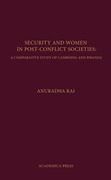Security and Women in Post-Conflict Societies: A Comparative Study of Cambodia and Rwanda
 The study has assessed the reconstruction programs in the post-conflict societies of Cambodia and Rwanda in the context of existing security challenges to women compared to their pre-conflict role and status. It has examined the causes of violence against women and how much the political stability, democratic form of government and economic progress helps to ensure security to women. It has analyzed the two cases in the light of feminist claim that post-conflict reconstructions are prejudiced against women. It has further scrutinized the role of political representation of women in the advancement of women’s security. In Rwanda, the representation is one of the highest among the post-conflict countries and also in the world, but the social and economic indicators are comparatively lower. On the other hand, in Cambodia, the representation is low, but the social and economic indicators are high in comparison with Rwanda. A comparative study has been made to look into the inter-relationship between women political representation and women security challenges in post-conflict Rwanda and Cambodia. The study has examined how the increased political representation of women in Rwanda compared to Cambodia has helped or not made a substantive difference in the advancement of women’s security. The major indicators which have been used for the study to assess the impact of reconstruction are, female population and women headed households, constitutional position of women, educational status, economic participation, land and property rights, women in family and society and societal approach towards the issue of domestic violence and the political participation of women.
The study has assessed the reconstruction programs in the post-conflict societies of Cambodia and Rwanda in the context of existing security challenges to women compared to their pre-conflict role and status. It has examined the causes of violence against women and how much the political stability, democratic form of government and economic progress helps to ensure security to women. It has analyzed the two cases in the light of feminist claim that post-conflict reconstructions are prejudiced against women. It has further scrutinized the role of political representation of women in the advancement of women’s security. In Rwanda, the representation is one of the highest among the post-conflict countries and also in the world, but the social and economic indicators are comparatively lower. On the other hand, in Cambodia, the representation is low, but the social and economic indicators are high in comparison with Rwanda. A comparative study has been made to look into the inter-relationship between women political representation and women security challenges in post-conflict Rwanda and Cambodia. The study has examined how the increased political representation of women in Rwanda compared to Cambodia has helped or not made a substantive difference in the advancement of women’s security. The major indicators which have been used for the study to assess the impact of reconstruction are, female population and women headed households, constitutional position of women, educational status, economic participation, land and property rights, women in family and society and societal approach towards the issue of domestic violence and the political participation of women.
ACADEMICA PRESS
1727 Massachusetts Avenue, NW, Suite 507
Washington, DC 20036
academicapress.editorial@gmail.com
